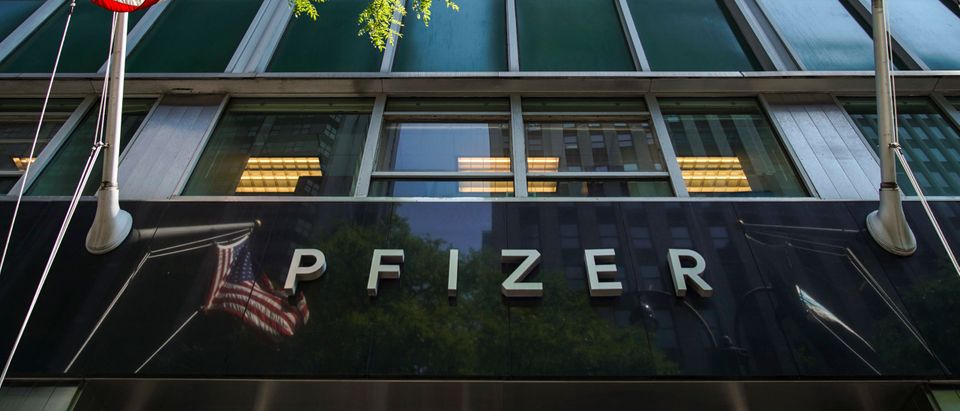Pharmaceutical giant Pfizer claimed Monday they were never part of the Trump administration effort “Operation Warp Speed” as their COVID-19 vaccine sees a 90% effective rate in its first analysis.
“We were never part of the Warp Speed … We have never taken any money from the U.S. government, or from anyone,” Kathrin Jansen, a senior vice president and the head of vaccine research and development at Pfizer said in an interview, according to The New York Times (NYT).
PFIZER: “We were never part of the Warp Speed. .. We have never taken any money from the U.S. government, or from anyone.”https://t.co/eKhxFwOwRY https://t.co/7zUKkUWUf7
— Carl Quintanilla (@carlquintanilla) November 9, 2020
Despite Jansen’s insistence that Pfizer was not involved in Operation Warp Speed — President Donald Trump’s initiative that partnered with public and private sectors to speed up the vaccine development process, in part by slashing regulations — Pfizer took a hefty paycheck from the program.
The U.S. government placed an initial order of 100 million doses for $1.95 billion, according to Pfizer’s July press release.
“Pfizer Inc. and BioNTech SE today announced the execution of an agreement with the U.S. Department of Health and Human Services and the Department of Defense to meet the U.S. government’s Operation Warp Speed program goal to begin delivering 300 million doses of a vaccine for COVID-19 in 2021,” their release read.
Aside from the massive payout, Pfizer also benefited from accelerated regulatory protocols.
Pfizer and BioNTech jointly developed the vaccine, per their press release. Pfizer said they will successfully manufacture the vaccine after they obtain “approval or emergency use authorization from the U.S. Food and Drug Administration (FDA).”
Pfizer said they were going to seek “approval or emergency use authorization” in October. Operation Warp Speed allows pharmaceutical companies to “manufacture at risk,” meaning that rather than follow traditional timelines to produce a vaccine, pharmaceutical companies can begin manufacturing vaccines at an industrial level before the vaccine is approved by the FDA, according to the Department of Health and Human Services (HHS). This increases financial risk to the company, per HHS, but “not the product risk.”
Pfizer announced in May that they were “taking a number of steps to scale up manufacturing operations at risk to accelerate” their ability to supply the vaccine once it’s approved. Operation Warp Speed allowed pharmaceutical companies to manufacture at risk. (RELATED: Trump Administration Strikes Deal With CVS, Walgreens For Free COVID Vaccines For Residents Of Long-Term Care Facilities)
“Expanding Operation Warp Speed’s diverse portfolio by adding a vaccine from Pfizer and BioNTech increases the odds that we will have a safe, effective vaccine as soon as the end of this year,” Secretary of Health and Human Services Alex Azar said in July. “Depending on success in clinical trials, today’s agreement will enable the delivery of approximately 100 million doses of this vaccine to the American people.”
While Pfizer didn’t take funds for research and development, they nonetheless capitalized on regulatory protocols being fast-tracked, along with a deal with the government.
Trump has long touted his administration’s work to speed up a COVID-19 vaccine, saying in October that his administration was on track to deliver a vaccine before 2021.
“We remain on track to deliver a vaccine before the end of the year, and maybe even before November 1st,” Trump said. “We think we could probably have it sometime during the month of October.”
Vice President-elect Kamala Harris said in September that Trump’s claim about a vaccine was not trustworthy, according to Reuters.
“He’s looking at an election coming up in less than 60 days and he’s grasping for whatever he can get to pretend he can be a leader on this issues when he’s not,” she said.
President-elect Joe Biden expressed similar concerns in September, per the NYT.
“Scientific breakthroughs don’t care about calendars any more than the virus does,” he said. “They certainly don’t adhere to election cycles. And their timing and their approval and their distribution should never, ever be distorted by political considerations. It should be determined by science and safety alone.”
Democratic New York Gov. Andrew Cuomo said Monday that it’s “bad news” that Pfizer’s vaccine came out during the Trump administration and that he will work with other governors to “stop” distribution “before it does damage.” Cuomo called Trump’s vaccination plan “flawed,” saying the vaccine rollout would disadvantage certain communities.
!@NYGovCuomo says it’s “bad news” Pfizer’s Covid vaccine came during the Trump Admin; says he’s going to work w/ other governors to “stop” distribution “before it does damage” pic.twitter.com/ULembNWokW
— Tom Elliott (@tomselliott) November 9, 2020
The Trump administration has a vaccine prioritization plan that works with local jurisdictions in New York, California and other hard-hit states that requires jurisdictions to lay out “specific groundwork for vaccinating high-risk and prioritized populations.”
It’s worth noting that Biden received more than $6 million from Big Pharma during the election cycle. Trump received slightly over $1.5 million.


